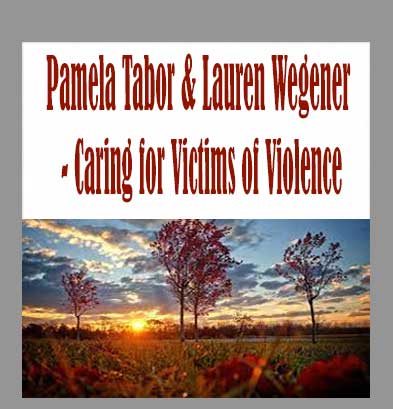
Description
Pamela Tabor & Lauren Wegener – Caring for Victims of Violence: Forensic Approaches for Healthcare Providers: From Injury to Healing download , Pamela Tabor & Lauren Wegener – Caring for Victims of Violence: Forensic Approaches for Healthcare Providers: From Injury to Healing review , Pamela Tabor & Lauren Wegener – Caring for Victims of Violence: Forensic Approaches for Healthcare Providers: From Injury to Healing free
Pamela Tabor & Lauren Wegener – Caring for Victims of Violence: Forensic Approaches for Healthcare Providers: From Injury to Healing
Across various roles, specialties, and settings, you are seeing victims of trauma, violence, intentional/unintentional injuries, and even death. Discover essential new strategies to care for these most vulnerable patients.
As a professional who works with victims (and survivors!) of violence, crime, and abuse, you need to have thick skin… and unwavering empathy. From collecting forensic evidence and documenting your findings, to providing trauma-informed care for healing, your work is intense, exhausting, and stressful.
Working with patients who have been through a terrifying experience is difficult, leaving you feeling helpless to provide the evidence-based care they need. .
But you love to make a difference. When you participate in this course, you’ll train with leading experts in forensic and trauma-informed care. You’ll walk away with the confidence to manage these difficult situations… from examining a patient after a violent assault… to calming a suicidal patient… to helping these individuals on the path to healing!
This comprehensive training includes everything you need to know on the most effective interventions to provide your patients the best possible care. Your training will set you apart as a skilled forensic care professional with specialized knowledge and skills.
Gain confidence as you explore practice-changing treatment for…
- Child Maltreatment/Infant Death
- Sexual Assault/Human Trafficking
- Elder Abuse/Intimate Partner Violence
- Addiction
- Legal Implications/Protecting Your License
- Suicide
- Forensic Mental Health
- Violent Behaviors
- Testifying as an Expert Witness
- Vicarious Trauma
- Trauma-Informed Care
- Working with Law Enforcement
- The Healing Journey
- And much, much more!
Your patients require and deserve a compassionate, devoted, and well-trained forensic provider to avoid re-victimization — and to begin the healing process. Imagine if you had that superpower!
Course Features
★ Over 26 hours of on-demand sessions covering topics from injury through healing
★ Current information on caring for victims of sexual assault, intimate partner violence, human trafficking, strangulation, and more
★ Unique session regarding healthcare serial killers
★ Designed for individuals who care for victims — Nurses, NPs, PAs, therapists, counselors, social workers, and more
★ Leading specialists to deliver vital training on best practices during times of violence and trauma
★ Overview of trauma-informed interventions to help survivors heal
★ Guidance for working with suicidal individuals
★ Design your own learning experience
Meet Your Faculty
Dr. Pamela D. Tabor, DNP-Forensics, AFN-BC, serves as a consultant and expert witness in the private sector and for the Department of Defense in military trials. She has testified before the legislature on numerous occasions, consulted at the Pentagon, served as the director for the Arkansas Infant & Child Death Review Program, and developed the Sudden Unexplained Infant Death Investigation Training Program in Arkansas. Pamela holds a Doctor of Nursing Practice degree with a forensic focus, is a Board-Certified Advance Forensic Nurse, and has an Advance Health Specialty Forensic Science Certification. She is a Certified Law Enforcement Standards and Training Instructor and a Fellow with the International Association of Coroners and Medical Examiners. She served two terms on the board of Directors for the International Association of Forensic Nurses and earned the Distinguished Fellow award. Pamela has published articles in peer-review journals, authored a book chapter in Core Curriculum for Forensic Nursing, and is currently working on a chapter about stalking for the Academy of Forensic Nurses.
Lauren Wegener MSN-FN, RN, SANE-A, SANE-P, is a forensic nurse examiner. Her current role includes performing case reviews, precepting new sexual assault nurses, and practicing through telemedicine. Her expertise has been sought for trial work consultation/expert testimony and serves as a preceptor for regional and statewide Sexual Assault Nurse Examiners (SANE) throughout Arkansas. She is trained through the International Association of Forensics Nurses approved program to provide acute and non-acute for the adult, adolescent, and pediatric victims of sexual assault and abuse.
Course Outline
Forensic Nursing: Caring for Victims of Trauma, Violence & Intentional Injuries
Clinically Relevant Identification of Intentional vs Unintentional Injuries
- Intentional injuries
- Unintentional injures
- Blunt and sharp force trauma and gunshot wounds
- Diagrams, photos, and documentation
Investigating Infant Deaths
- Five cardinal rules of bruising
- Abusive head trauma
- Differentiate between types of sudden unexplained infant death
- Case study demonstration: Using an infant death investigation kit
Child Maltreatment: The Death of Innocence
- Mechanisms of trauma
- Neglect and the difficulty of substantiating
- Identification and documentation
- Photos and case study
Sexual Assault: Comprehensive Assessment and Evidence Collection
- Obtaining history
- Forensic exam demonstration with chart examples
- Evidence collection process
- Demonstration of alternative light source, collection techniques, sexual assault collection kit, and body maps
Stalking: Lethal Hide and Seek
- Categories of stalking and case study
- Stalker typologies
- Stalking, intimate partner violence and femicide
- Stalking of healthcare workers
- Interactive use of the Stalking and Harassment Assessment Risk Profile (SHARP) Tool
Strangulation: Snuffing Out Lights and Lives
- Types of strangulation
- Symptoms and health consequences of strangulation
- Case study with photos
Intimate Partner Violence (IPV): Love Turned Violent
- Direct and indirect indicators of IPV
- Behaviors of abusers
- Walker’s Cycle of Violence
- Demonstration of IPV screening tools
Human Trafficking: Modern Day Slavery
- Scope of human trafficking
- Types of human trafficking with case examples
- Human trafficking vs. human smuggling
- Actus Reus requirements
Forensic Mental Health Nurse (FMHN): Therapeutic Alliance
- Consulting with defense, prosecution, and law enforcement
- Suicide and case study
- Critical stress debriefing
Elder Abuse: Caring for Those Who Cared for Us
- Vulnerability
- Seven categories of elder abuse
- Resources for investigation
- Case study with photos
Medicolegal Death Investigation: Be an Investigator or Nurse Coroner
- Manners and causes of death
- Signs of impending death
- Postmortem changes and decomposition
- Case study with photos
Testifying as an Expert Witness or Serving as a Consultant
- Factors in the judicial process
- Testifying for the defense or prosecution
- Mock trial and techniques for testifying
- Building a consulting practice
Healthcare Serial Killers (HSK): Killers Instead of Healers
- Case studies
- HSK behaviors, methods, and motivations
- Victimology
- Strategic positioning for the forensic nurse in interventions, identification, and investigations
Correctional Forensic Nursing: Behind the Bars
- Correctional settings
- Role and practice issues
- Geriatric and female offenders
Vicarious Trauma (VT): Fortifying Forensic Nurses
- Case study utilizing a personal story of VT
- Terminology associated with VT
- Symptoms and progression of VT
Plus, you receive 3 additional video recordings!
over 14 hours of additional content
Trauma-Informed Interventions: Domestic and Intimate Partner Violence
Katelyn Baxter-Musser, LCSW, C-DBT
Crisis Intervention & Safety Planning
- Barriers to leaving
- Safety plans while living with abusive partners
- Emotional safety planning
- Plans for leaving and after leaving
- Restraining orders/protective orders
Trauma-Informed Interventions
- Assess for PTSD, anxiety, trauma, and other mental health issues
- Understand the multilayered impact of DV/IPV
- Processing shame, anger, and guilt
- Research, limitations, and treatment risks
Vicarious Trauma & the Clinician
- What is compassion fatigue
- Recognizing signs of burnout
- Self-care techniques for the professional
High-Risk Clients: Effective Clinical Interventions for Client Emergencies Related to Suicide, Substance Abuse Disorder, Violence & More
Paul Brasler, MA, MSW, LCSW
Client Assessment: Ask the Right Questions
- Conduct comprehensive assessments
- Strategies for eliciting the right information
- What to ask yourself as you watch the client
- Can the client provide informed content?
- Limitations of the research & potential risks
The Suicidal Client: Recognize Suicide Risk & Effectively Intervene
- Who is most at risk?
- Implicit & explicit expressions of suicidal ideation & intent
- Lethality assessment to protect client & clinician
- Self-injurious behavior & suicidal ideation
- How to conduct a suicide assessment
- Safety planning for clients with suicidal ideation
- When to hospitalize
- Voluntary vs. involuntary hospitalization
- When clients are not admitted to the hospital
The Violent Client: Confidently Manage Dangerous Situations
- Dealing with our fears: Clinicians’ safety
- When the clinician is the target
- When others are the target
- De-escalation techniques
- Preventative planning
- When to call 911
- The hospitalization process
- Duty to Protect (formerly Duty to Warn)
The Addicted Client: What ALL Clinicians Need to Know
- Signs of intoxication
- Imminent risk: Signs & symptoms of overdose
- Identify withdrawal syndromes
- Treatment planning
- Drug basics that clinicians should know
- Need-to-know street names of common drugs
- When and how to refer to a higher level of care
Medical vs. Psychiatric Problems: Recognize the Difference
- What could kill the client first?
- Medical emergencies that present with psychological symptoms
- Signs & symptoms of a medical emergency
The Traumatized Client: When Trauma Becomes High Risk
- Recognize trauma in clients
- Dangers of misdiagnosis & improper treatment
- Strategies for trauma-informed care
High-Risk Clinicians: After the Crisis
- Protect your license with documentation
- Debriefing & supervision
- Address vicarious trauma
- Mitigate compassion fatigue
Human Trafficking Hidden in Plain Sight: Essential Identification & Treatment Techniques to Help Clients Recover & Build Thriving Lives
Shari Kim, PhD, CCDC
Human Trafficking: What You Need to Know
- Types of trafficking
- Where people are trafficked
- Risk factors for trafficking victimization
- Limitations of the research and potential risks
Clinical Treatment for Human Trafficking Survivors
- How to identify and what to watch for in-session
- Identify risk in the clinical interview
- Trafficking screening and assessment tools
- How to respond if you suspect trafficking
- Case example: How the signs of a 16 year old trafficked female go unnoticed
Special Considerations for Populations at High Risk
- Overcome Brainwashing and Stockholm Syndrome
- Psychological underpinnings of entry to trafficking
- Why victims stay (and why they return)
- Psychological processes of luring in victims
Treating the Trauma of Trafficking
- Prolonged Exposure, EMDR, Cognitive Processing Therapy for trafficking-related PTSD
- Strengths-based treatment approaches
- The essential components of trauma-informed care
Treatment Obstacles and What to do About Them
- Building and maintaining trust with a trafficking victim
- The power of brainwashing and who is vulnerable to being trafficked
- Who is at higher risk of being trafficked
- Risk of returning to trafficking
- Safety issues
Post-Traumatic Growth: Transformation from Victim to Survivor
- Help clients find meaning after trauma
- Create a comprehensive, individualized recovery plan
- Case examples: From trauma to recovery
The Legal Process
- Federal and local trafficking protections
- Why it’s so difficult to investigate and prosecute trafficking cases
- The unique protection needs of survivors
- Case examples
Frequently Asked Questions:
- Innovative Business Model:
- Embrace the reality of a genuine business! Our approach involves forming a group buy, where we collectively share the costs among members. Using these funds, we purchase sought-after courses from sale pages and make them accessible to individuals facing financial constraints. Despite potential reservations from the authors, our customers appreciate the affordability and accessibility we provide.
- The Legal Landscape: Yes and No:
- The legality of our operations falls into a gray area. While we lack explicit approval from the course authors for resale, there’s a technicality at play. When procuring the course, the author didn’t specify any restrictions on resale. This legal nuance presents both an opportunity for us and a boon for those seeking budget-friendly access.
- Quality Assurance: Unveiling the Real Deal:
- Delving into the heart of the matter – quality. Acquiring the course directly from the sale page ensures that all documents and materials are identical to those obtained through conventional means. However, our differentiator lies in going beyond personal study; we take an extra step by reselling. It’s important to note that we are not the official course providers, meaning certain premium services aren’t included in our package:
- No coaching calls or scheduled sessions with the author.
- No access to the author’s private Facebook group or web portal.
- No entry to the author’s exclusive membership forum.
- No direct email support from the author or their team.
We operate independently, aiming to bridge the affordability gap without the additional services offered by official course channels. Your understanding of our unique approach is greatly appreciated.
- Delving into the heart of the matter – quality. Acquiring the course directly from the sale page ensures that all documents and materials are identical to those obtained through conventional means. However, our differentiator lies in going beyond personal study; we take an extra step by reselling. It’s important to note that we are not the official course providers, meaning certain premium services aren’t included in our package:
Refund is acceptable:
- Firstly, item is not as explained
- Secondly, Item do not work the way it should.
- Thirdly, and most importantly, support extension can not be used.
Thank you for choosing us! We’re so happy that you feel comfortable enough with us to forward your business here.
- Innovative Business Model:








Reviews
There are no reviews yet.